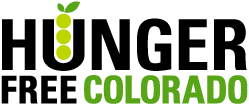Denver agencies join community partners to find solutions to food insecurity in Denver
DENVER (November 16, 2017) – In Denver, nearly one out of every six households experience food insecurity, and roughly one in five children suffers from hunger. Whether due to lack of income, lack of access to healthy food, or lack of knowledge of resources and help available, Denver residents are going hungry when they shouldn’t. To address this gap, the City and County of Denver is working with community partners to identify barriers and to explore effective ways to connect people with the food necessary to live better, healthier lives.
In Denver county, only 64 percent of those eligible to receive food stamp benefits through the Food Assistance Program (federally known as the Supplemental Nutritional Assistance Program, or SNAP) receive them. To identify why enrollment is low and to develop solutions to connect more Denver residents with needed food resources, Denver Human Services (DHS) is participating in the Denver Food Assistance Program Task Force, convened by Hunger Free Colorado, the Food Research & Action Center, and The Food Trust.
“Having access to adequate, nutritious food doesn’t just benefit an individual or family, it benefits our whole community,” Denver Human Services Executive Director Don Mares said. “When people have enough food to eat, children perform better in schools and adults are more successful at work, leading to a healthier, more productive society. The Denver Food Assistance Task Force is working to identify ways to increase access to food assistance enrollment to improve the overall wellbeing of our community today and for the future.”
A growing body of national research shows the positive impact of food stamps for our health and economy, such as lowering health care costs, improving short- and long-term medical outcomes, promoting work and economic stability, and boosting local economic activity, such as grocery sales. Denver alone receives a stimulus of almost $242 million annually from benefits issued, but misses an additional $67 million due to low enrollment.
“Food stamps continues to be one of the most efficient and effective ways of addressing hunger and provides residents with additional purchasing power in grocery stores to select the foods which are right for their families,” said Kathy Underhill, CEO of Hunger Free Colorado. “Federal nutrition programs, along with state and local counterparts, play an important role in connecting people of all ages, backgrounds and zip codes to needed food.”
Increased enrollment in the Food Assistance Program will go a long way to helping Denver residents afford nutritious food, but it’s only part of the solution. Limited access to grocery stores or food markets is another barrier to needed nutrition. According to the Denver Food Baseline Plan, put together by the Denver Department of Environmental Health, 49 percent of low- to moderate-income Denver neighborhoods lack convenient access to grocery stores.
“Ensuring adequate healthy food is available for all Denver residents will require addressing food access alongside food affordability,” Denver Department of Environmental Health’s Manager of Food Systems Development Blake Angelo said. “Currently, roughly 14 percent of Denver families lack access to a grocery store that offers nutritious and affordable foods and beverages. Expanding SNAP enrollment is a critical step in meeting the pressing needs of our most vulnerable households. Increasing the number of stores carrying healthy foods and beverages in underserved communities is another.”
The Food Assistance Task force held its first meeting on Monday, Nov. 13, 2017 and will meet in February and June of 2018 to develop an action plan and recommendations to address the opportunities to increase SNAP enrollment. Enrolling in SNAP is easy and can be done online at www.colorado.gov/PEAK or by visiting any DHS location.
About Denver Human Services
Denver Human Services provides assistance benefits and protection and prevention services to one in three Denver residents. Assistance programs including food, cash and medical benefits, child care, child support, and general assistance are provided to eligible Denver residents in financial need. Other assistance programs include Employment First and Veterans Services, which work with Denver residents and veterans on job placement and retention. Protection & Prevention services are provided via child, youth and adult protection, along with community-focused programming that includes in-home services designed to strengthen families and prevent abuse or neglect. For more information, visit www.denvergov.org/humanservices.
About Hunger Free Colorado
Hunger Free Colorado, a statewide nonprofit organization launched in 2009, connects families and individuals to food resources and fuels change in systems, policies and social views, so no Coloradan goes hungry. By leveraging the power of collaboration, innovation and partnership, we eliminate barriers to the access of affordable, nutritious food, so all Coloradans can thrive and reach their full potential. Some of our key initiatives include a statewide food resource hotline and mobile services, Hunger Through My Lens, and the Colorado Food Pantry Network. Learn more and take action at HungerFreeColorado.org.
About the Denver Department of Environmental Health
As Denver’s nationally-accredited local public health agency, the Department of Environmental Health (DEH) is dedicated to advancing Denver’s environmental and public health goals. The divisions of DEH include: Denver Animal Protection, Community Health, Environmental Quality, Office of the Medical Examiner, and Public Health Inspections. For more information about Environmental Health visit www.Denvergov.org/EnvironmentalHealth. Follow us on Twitter.com/DenEnviroHealth.
Media Contact: Courtney Meihls, (720) 944-2405
